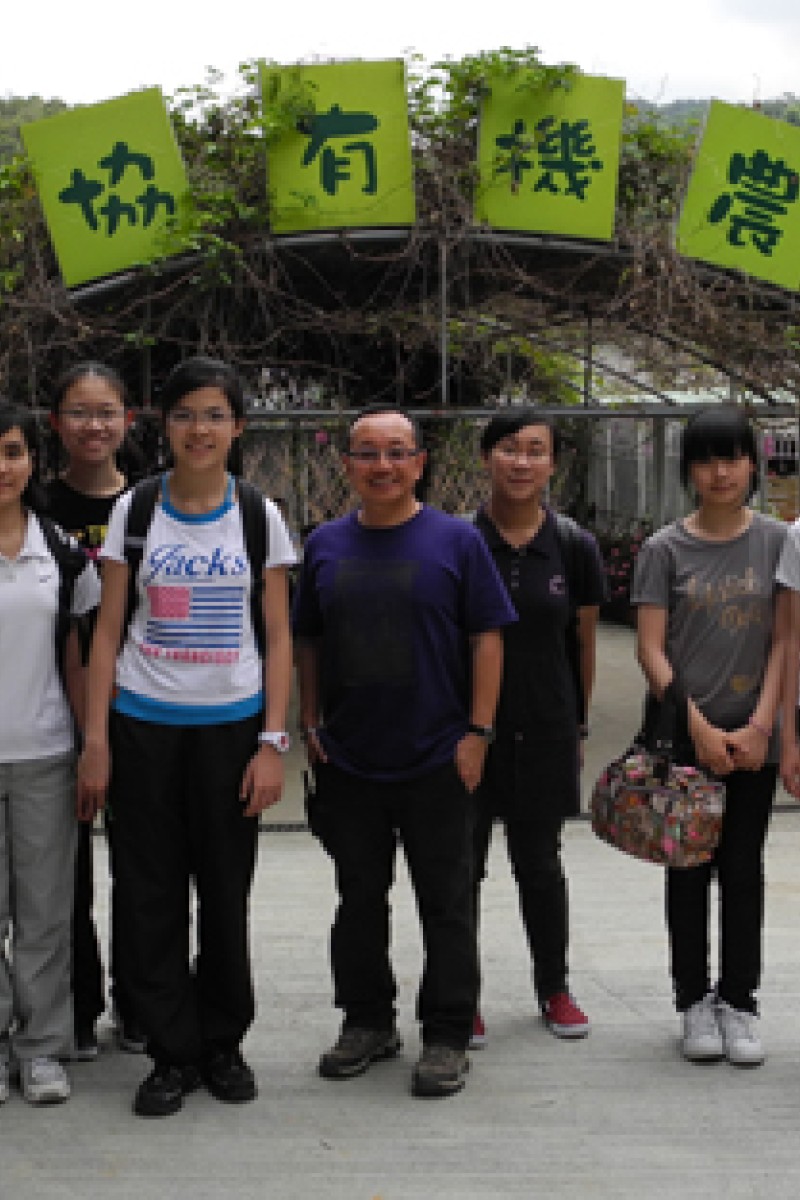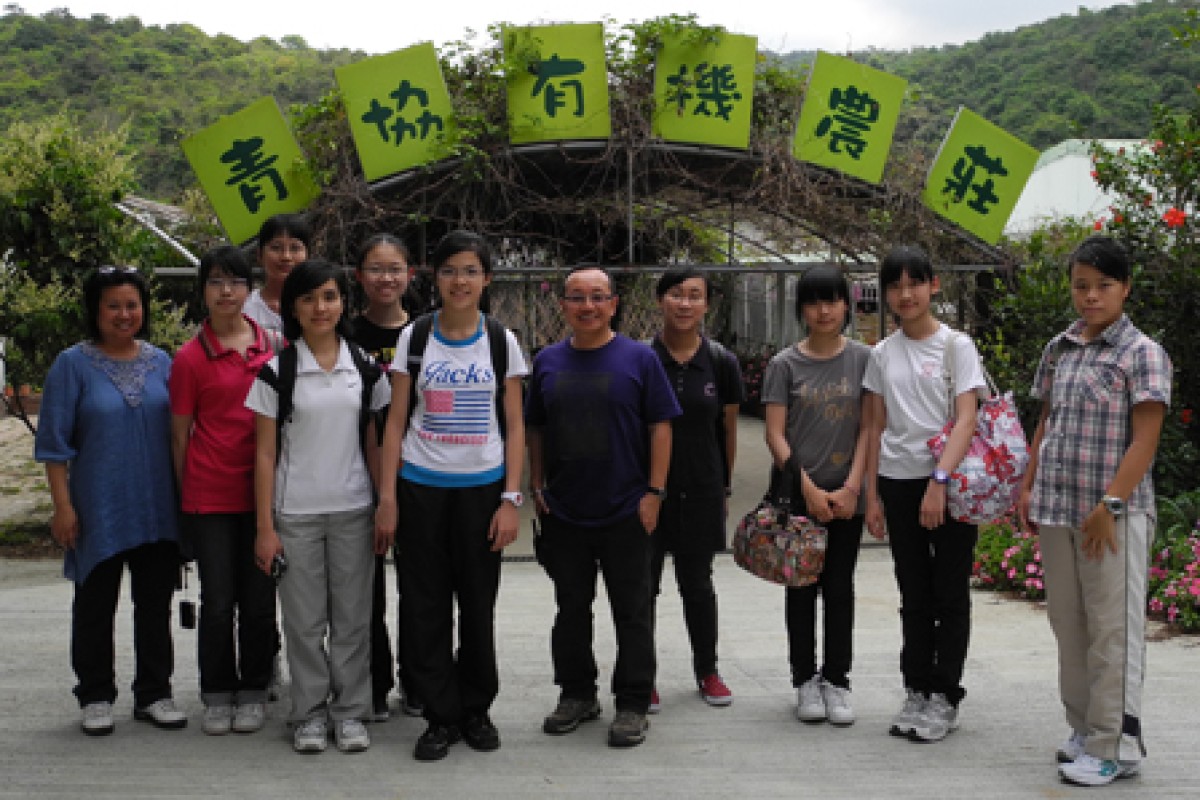
Organic farming is still a novelty in Hong Kong, but there's plenty to learn from the concept

The farm covers a total area of 13,500 sq m, of which 7,300sq m is set aside for growing vegetables. Guide Wong Tin-sang, who is in charge of the farm, helped us to understand how the farm is run and how it uses things such as seasonal plants, and natural pesticides and fertilisers.
Here some of our reporters explain what they learnt.
Nola Yip
This is the first organic farm to be officially recognised in Hong Kong. It is well managed.
Organic farming methods were chosen because of the harm toxic chemicals can cause to crops, the land, and the people.
Everything that grows on the farm looks fresh and natural. The materials used in the farming process, such as fertilisers, are all environmentally friendly.
The farm enforces strict rules which guarantee that all of the crops grown there are free of chemicals. None of the crops have been grown from genetically modified seedlings.
Our guide Wong Tin-sang told us that staff members are not even allowed to use insect-repellent sprays that contain man-made chemicals. This is to prevent the chemicals from affecting the quality of the surrounding soil and crops.
There are numerous nets and canopies to prevent insects from eating the crops. In addition, there are many traps, such as open bottles of sweet juice, which attract and drown insects.
The farm helps promote a sustainable lifestyle through the growing of its organic foods.
Wong also told us that Hongkongers can support the development of sustainable farming by buying local, seasonal fruits and vegetables.
For example, we should avoid buying imported strawberries in winter. Instead we should buy local-grown strawberries during summer.
After gaining a better understanding of organic farming methods, I have learnt that we must treasure the food we have.
I hope the true message and value of organic food will spread far and wide.
Leona Chen
Most people know that non-GM seeds are used in organic farming. Organic farmers only use natural compost, while they prevent weeds from growing and eliminate pests such as insects through organic means.
The use of such natural methods ensures that the food grown on organic farms is healthier for us. Many people support the idea of organic products.
But organic foods cannot be produced as easily as those farmed elsewhere. Man-made chemicals are frequently sprayed on vast areas of non-organic farmland to kill insects. They are also used as fertilisers. But these chemicals can often be harmful to the soil and other animals.
Organic farms cannot use such products to kill off pests and weeds, so farming methods tend to be more labour-intensive. This increases the cost of organic food. Besides the hard work, running an organic farm involves a lot of careful planning and research. The farmers must know about the lifecycle of different plants, such as the best time for planting and when the fully grown crops are ready to be harvested. This ensures that the limited space on the farm can be used efficiently.
Through the visit, I realised there are so many things to be done outside the city. I felt closer to nature, and it encouraged me to sign up to help out at the farm this summer.
Gigi Kwok Tik-yan
I'd been to a farm before, but not an organic farm. This trip taught me what it means to be "organic". No chemicals, such as fertilisers and pesticides, or genetically modified seeds are used anywhere on the farm. Chemicals are avoided in order to ensure no harm is done to the crops or the soil.
I also learnt about the term "pest" in terms of organic farming; butterflies look beautiful when they are flying about, but they are regarded as pests by organic farmers. Butterflies may bring in pollen that contain tiny traces of chemicals which will pollute the organic farm's soil. Butterflies also lay eggs which will produce caterpillars that feast on the leaves of crops and kill them.
Elise Choi
Whenever we walk around a supermarket, we see products - especially vegetables - that are labelled as "organic".
I didn't know about the difference in the way they are grown, compared to normal products, until I visited the organic farm.
Seeing how the farm is run was very thought-provoking. Organic farms never use genetically modified seeds, or chemicals in fertilisers, weed killers or insecticides because such things will be harmful to the soil and the environment.
There is very little support for organic farming in Hong Kong, which means it is hard for the farms to make money.
The ultimate goal of running an organic farm is to preserve our natural resources and lead a sustainable lifestyle. Organic farmers encourage us to to eat local, seasonal food to reduce carbon emissions caused by food imports. I learnt that we must treasure food, and only cook what we need. We should not go to buffets where a lot of food is wasted.
After this visit, my attitude has totally changed. I am now more aware of my eating habits.
Natalie Fung
As we pulled into the farm, the exotic view of lush fields, bright green vegetation, and the honeyed scent in the air, made me catch my breath.
Our guide Wong Tin-sang explained that the products used on an organic farm neither contain chemicals nor are they genetically modified. This also means no pesticides. This worried me - did that mean all the plants would have huge holes caused by insects?
But when we entered a massive tent filled with vegetables, I was amazed by the sturdy choi sum, the stout cabbage, and the emerald green Romaine lettuce, all perfectly healthy - and hole-free! We were told that other methods, such as insect nets, are used to keep nibblers away.
The farmers' dedication to their job made me realise the value of trying to lead a more sustainable life.
Tsau Jin-cheng
People are becoming increasingly health conscious and many of them choose to eat healthier foods.
One of the best alternatives is organic food. Organic products are often more nutritious than normal food because they are free of chemicals and other harmful substances.
Organic farmers also carefully plan their crops each year so that the soil gets a chance to recover. Such farming methods do not harm our health or the environment.
The words "natural", "healthy" and "organic" often appear on food products in supermarkets. But few shoppers know much about what it takes to grow organic food.
The tour also taught me the importance of eating seasonal, locally grown food.
Food often has to travel long distances from farms before it ends up on the shelves of our local supermarkets. Sometimes food has been grown and transported from the other side of the world.
By eating food that is grown locally - rather than those produced in Europe, Africa or South America - we avoid the high transport costs and the increased levels of carbon dioxide caused by the burning of aircraft fuel.
We are forced to reflect on our lives many times. This workshop definitely made me rethink my habits.
Fung Wing-hei
Only organic fertilisers are used on the farm. They are made from natural products, such as human and animal waste, bones from slaughterhouses, and various waste products from chicken farms, fish, vegetables and other agricultural products.
All the waste products are mixed together with lime and then put in a tank, where they slowly decay. Heat and humidity help break down the waste which can be used as fertiliser later.
Workers need to carefully monitor the waste in the tank. It can take up to three months before the waste can be used on the farm.
All around the organic farm there are large nets which prevent birds and insects from damaging the crops. Transparent plastic sheets also cover parts of the farmland, helping to control the amount of rainwater that reaches the crops. These sheets can also help maintain the soil's moisture when there's no rain.
After visiting the farm, I understood how important food is for our survival. Although organic products may be expensive, the farmers' efforts remind us to respect food and the planet.
Photos: Joyee Chan